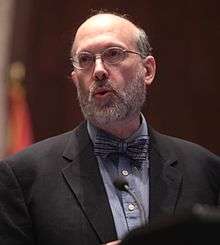Philip Hamburger

Philip Hamburger is an American legal scholar. Hamburger holds a Juris Doctor from Yale Law School (1982) and a Bachelor of Arts from Princeton University (1979).[1]
Hamburger is the Maurice and Hilda Friedman Professor of Law at the Columbia University School of Law. He is a legal historian and a scholar of constitutional law. Before moving to Columbia, Hamburger was John P. Wilson Professor at the University of Chicago Law School, where he was also Director of the Bigelow Program and the Legal History Program. He was previously Oswald Symyster Colclough Research Professor at George Washington University Law School and, before that, he taught at the University of Connecticut Law School. He has been a visiting professor at the University of Virginia Law School and was the Jack N. Pritzker Distinguished Visiting Professor of Law at Northwestern Law School. Early in his career, he was an associate at the law firm of Schnader, Harrison, Segal & Lewis LLP in Philadelphia.
Scholarship
Hamburger is a leading scholar of the First Amendment who "made a valuable contribution to our knowledge of Jefferson's thinking and actions with respect to matters of church and state".[2] He is known for arguing that “the First Amendment, originally thought to limit the government, has been increasingly interpreted by the Court to mean limiting religion and confining it to the private sphere.”[3]
Fruchtman, reviewing Law and Judicial Duty (2008), says it, "is by any definition ground-breaking. It is a creative, magisterial contribution to our understanding of judicial review and an independent judiciary."[4]
Justice Hugo Black, who served on the Supreme Court 1937 to 1971, came under attack from Hamburger who argues that Black's views on the need for separation of Church and State were deeply tainted by prominent roles in the Ku Klux Klan, a vehemently anti-Catholic organization.[5] Hamburger relies on Black's biographers who say he was a KKK member and actively campaigned for Senate in 1926 at nearly all of Alabama's 148 KKK Klaverns, where he attacked the Catholic Church. Biographer Newman quotes his campaign manager as saying Black "could make the best anti-Catholic speech you ever heard."[6]
Publications
- Is Administrative Law Unlawful? (University of Chicago Press, 2014)
- "Beyond Protection," Columbia Law Review (2009)
- Law and Judicial Duty (Harvard University Press, 2008) excerpt and text search
- Separation of Church and State (Harvard University Press, 2002)
- "Religious Liberty in Philadelphia," Emory Law Journal (2005)
- "The New Censorship: Institutional Review Boards," Supreme Court Review (2004)
- Separation of Church and State (Harvard U.P,. 2004) excerpt and text search
- "More is Less," Virginia Law Review (2004)
- "Law and Judicial Duty," George Washington Law Review (2003)
- "Liberality," Texas Law Review (2002)
- "Revolution and Judicial Review: Chief Justice Holt's Opinion in City of London v. Wood," Columbia Law Review (1994).
Further reading
- Peter Steinfels, "Beliefs; Behind the concept of the separation of church and state, a scholar finds some unsettling origins," New York Times, July 6, 2002
References
- ↑ See "Philip Hamburger" at Columbia Law School directory
- ↑ Francis D. Cogliano, Thomas Jefferson: Reputation and Legacy (Edinburgh University Press, 2006), p. 150, 154.
- ↑ See "Fundamentalist secularism threatens U.S., warns ambassador to the Holy See," online
- ↑ Jack Fruchtman Jr., "'Gibbons v. Ogden,' Law, and Society in the Early Republic, and: Law and Judicial Duty, and: Legislating the Courts: Judicial Dependence in Early National New Hampshire (review)," Journal of the Early Republic (2011) 31#2 pp. 313-318 doi:10.1353/jer.2011.0030
- ↑ Hamburger, Separation of Church and State pp 422-28
- ↑ Roger K. Newman, Hugo Black: a biography (1997) p 104